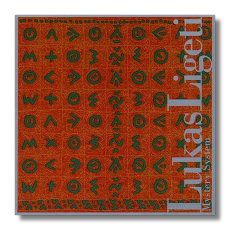
The Internet's Premier Classical Music Source
Related Links
- Latest Reviews
- More Reviews
-
By Composer
-
Collections
DVD & Blu-ray
Books
Concert Reviews
Articles/Interviews
Software
Audio
Search Amazon
Recommended Links
Site News
 CD Review
CD Review
Lukas Ligeti

Mystery System
- Mystery System - Pattern Transformation
- Moving Houses
- Independence
- New York to Neptune
- Delta Space
Amadinda Percussion Group
Ethel; Procédé Rodesco-Letort; Kathleen Supové, piano
Tzadik TZ7099 DDD 52:50
Born in Vienna to famed Hungarian composer György Ligeti (the composer who almost became a household name when several of his works were appropriated for Stanley Kubrick's 2001: A Space Odyssey), Lukas Ligeti is worth getting to know on his own terms. The omnibus title of this CD is Mystery System, and the title is an appropriate one, as much of the music on the CD is both mysterious and systematic.
Ligeti studied at the Vienna Music Academy and later at Stanford, in the computer music lab. Now he lives in New York City, and his work is an intriguing mixture of music that has influenced him, from the European tradition, to American experimentation, to the polyrhythms and polymeters of the African continent. (For a time, he lived in Africa, and African influences can be heard in some of his father's later works as well.) At home in New York's downtown scene, Lukas Ligeti strikes me as a punkier, more relaxed and playful version of his father.
Pattern Transformation is a title that screams of Steve Reich. Written in 1988, it is scored for four musicians and two marimbas (another Reichian touch). Inspired by African music, this is a kaleidoscopic exercise in polymetric playing, and the Amadinda Percussion Group does a great job bringing off a work the composer originally feared to be "impossible to play." The Amadindas also play Independence, which dates from 2002. It extends ideas introduced in Pattern Transformation, both in terms of complexity and of length. (At nearly 17 minutes, this is the longest work on the CD.) It is in these two pieces that Ligeti most clearly reveals himself as "a chip off the old block."
Moving Houses (1996, rev. 2003) was commissioned by the Kronos Quartet, but here it is played (in a revised version) by the frumpily named Ethel. Yes, that is the quartet's name. And yes, the title does allude to the actual moving of houses. In this context, a recurring theme may be thought of as the "house," and the house is "moved" through an ever-changing musical environment incorporating sounds characteristic of classical, jazz, folk (Hungary, Norway, etc.), pop, and contemporary dance milieus.
New York to Neptune and Delta Space return more strongly to the idea of music that is impossible to play… at least by human hands. In the former, written in 1998, a string quartet (Procédé Rodesco-Letort) plays a duet with a drum machine. The sounds produced by the latter are purposely of the most clichéd sort, but Ligeti has fun with this by suggesting (or so it seems) that the drum machine, in spite of its ability to play with superhuman dexterity, may be in the process of breaking down in the course of the eponymous voyage! And, in Delta Space (2002), by placing pianist Kathleen Supové in front of a Yamaha Disklavier, she can, in effect, play a real-time duet (not necessarily a friendly one) on the same keyboard with a computer. Later in the piece, a sampler kicks in and inserts pre-recorded fragments of an African song into the mix to create a de facto trio. The combination is thick and heady.
This CD was produced by the composer, so I suppose the performances adhere closely to his wishes. Mystery System is a provocative glimpse at a new figure in New York's experimental scene, and I hope that Ligeti will continue to define and refine his far from negligible talents. Like father, like son? Not quite, but Lukas Ligeti certainly can hold his own.
Copyright © 2004, Raymond Tuttle




















